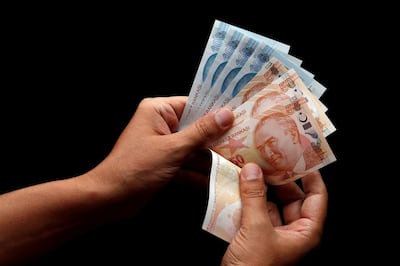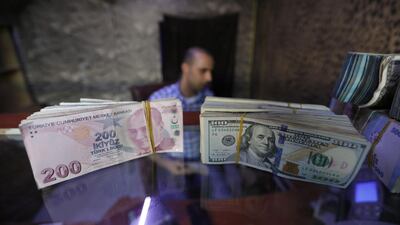The Turkish lira faced heavy selling pressure on Monday, falling by up to 15 per cent against the US dollar at one stage, after President Recep Tayyip Erdogan sacked central bank governor Naci Agbal on Friday.
The lira later made a slight recovery to trade at 7.8618 to the greenback at 2.20pm UAE time on Monday, about 8.2 per cent below Friday’s close.
Turkish government bonds also faced a sell-off, with 10-year US dollar securities trading about 11 per cent lower.
“For veterans on Turkey, this looks very much like a story they have seen several times before. Almost as soon as policy credibility is re-established, it is lost,” said Tellimer Research's head of equity research Hasnain Malik.
“The March 20 dismissal of the central bank governor signals that growth has again taken precedence over inflation control, foreign exchange reserve stabilisation and rate stability, even though the next general election is not due until mid-2023.”
Mr Agbal was fired a day after the regulator increased rates by 200 basis points to 19 per cent to strengthen the lira and tame inflation, which is currently more than 5 per cent.
His action brought the cumulative rate increase to 875 bps since his appointment in November. During his five-month tenure, the lira rose by more than 15 per cent.
He was replaced by Sahap Kavcioglu, a former banker and a member of the ruling Justice and Development Party.
Patrick Curran, a senior economist at Tellimer Research, expected a lira bloodbath yesterday as markets showed their "clear and strong dissatisfaction with Mr Agbal’s removal and begin to reverse the 18 per cent currency appreciation and $4.7 billion of domestic government debt and equity inflows that followed his appointment”.
The central bank has now had four governors in less than two years, underlining its lack of independence and the extent of policy interference.

Mr Kavcioglu said the central bank will continue to use monetary policy tools to achieve “a permanent fall in inflation”.
The regulator will also follow the previous schedule for rate-setting meetings, he said.
In a column in the Yeni Safak newspaper in February, Mr Kavcioglu said interest rate increases would indirectly cause inflation to increase. His unorthodox economic view is also espoused by Mr Erdogan, a vocal critic of high rates.
“Mr Agbal’s central bank adopted a more orthodox monetary policy,” said Stephen Innes, chief global market strategist at Axi.
The former governor enhanced regulator's inflation-fighting credibility during his “very short” tenure, he said.
His sacking weakens the foreign investment case for the local currency, equities and bonds, said Mr Curran.
Turkey’s stock market also experienced a sell-off, with the Borsa Istanbul 100 index trading 9.2 per cent lower.
A sustained depreciation in the lira could push inflation higher in the second half of this year, adding to the risk of the currency going into a tailspin, Scott Livermore, chief economist at Oxford Economics Middle East, told The National.
If Mr Kavcioglu does cut interest rates, it could result in lower real interest rates, rising inflation and further currency depreciation, according to analysts.
It could also deplete Turkey’s already fragile dollar reserves.
“Turkey is among a group of vulnerable emerging markets and has little ammunition to defend the lira, with reserves covering less than three months of imports and likely to quickly fall into stressed territory,” said Mr Livermore.


